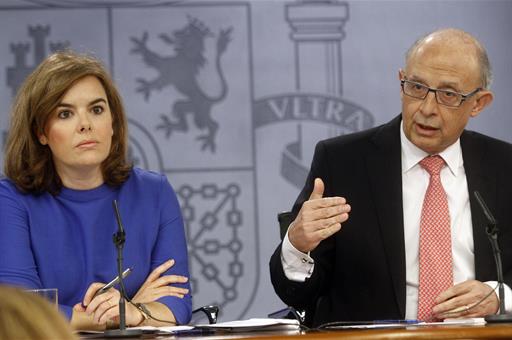Council of Ministers
Government approves new measures to eradicate late payments by public authorities
Council of Ministers - 2014.7.25
Moncloa Palace, Madrid
The Council of Ministers approved a Royal Decree developing the methodology to calculate the average payment term to suppliers, and the conditions and procedure to withhold resources under the financing regimes. It also approved a Royal Decree on the creation of an Economic-Financial Information Centre for the Public Administration Services.
The Vice-President of the Government, Soraya Sáenz de Santamaría, pointed out that these regulations seek "to eradicate late payments by public authorities, which have led to the closure of many companies during the crisis" and caused economic and financial difficulties to others. Along the same lines, the Minister for the Treasury and Public Administration Services, Cristóbal Montoro, recalled that fostering a reduction in the time that payments are made by public authorities to suppliers has characterised this government's actions since coming to power.
Cristóbal Montoro announced that in October, all public authorities will have to publish their average payment term to suppliers, on a homogenous basis. According to the minister, this is "a step forward in terms of transparency" since suppliers will be able to see whether the public administration services are reducing their payment term until such time as they come in line with the levels set by the Late Payment Act.
The minister clarified that in "the event of a public authority having problems and it has been detected that it is not meeting its commitments set by the law, the ministry may pay these invoices and this amount will be deducted accordingly from the corresponding funding". "The supplier is thus given a full guarantee to be paid on time", he stressed.
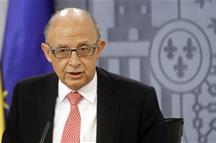 Pool MoncloaCristóbal Montoro highlighted that Central Government paid its suppliers at an average of 26.8 days in the first quarter of 2014, which is a "huge reduction" on the first quarter of 2012, when it stood at 41.7 days.
Pool MoncloaCristóbal Montoro highlighted that Central Government paid its suppliers at an average of 26.8 days in the first quarter of 2014, which is a "huge reduction" on the first quarter of 2012, when it stood at 41.7 days.
The minister also pointed out that the government is helping regional governments and local authorities to meet their financial commitments through the Supplier Payment Plan and the Regional Liquidity Fund (Spanish acronym: FLA). Through these mechanisms, suppliers have received a total of more than 60 billion euros.
The Minister for the Treasury and Public Administration Services announced that he will present a proposal on the re-structuring of loan conditions under the Regional Liquidity Fund to the Council of Ministers on Friday, 1 August, which will allow regional governments and local authorities to guarantee the provision of public services whilst benefitting from the best conditions available for loans and therefore be able to draw up their budgets for 2015 with more precision. These measures will be previously dealt with at the Fiscal and Financial Policy Council on Thursday 31 July.
When asked about the usefulness of publishing regional public accounts, he pointed out that this is an exercise in transparency for the government and an instrument for raising awareness among Spanish citizens. Under no circumstance is this "a balance sheet of regional funding", nor does it seek "to lay the foundations for a new model of regional funding", stated Cristóbal Montoro.
Employment trends
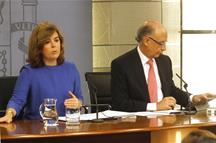 Pool MoncloaThe Vice-President of the Government reported that the Minister for Economic Affairs and Competition, Luis de Guindos, and the Minister for Employment and Social Security, Fátima Báñez, have presented a report on employment trends.
Pool MoncloaThe Vice-President of the Government reported that the Minister for Economic Affairs and Competition, Luis de Guindos, and the Minister for Employment and Social Security, Fátima Báñez, have presented a report on employment trends.
Soraya Sáenz de Santamaría considers that the figures in the Active Population Survey published on Thursday show a cyclical change highlighting the increased confidence in and expectations of the Spanish economy. "All the government's efforts have sought to turn around the trend of job losses, we have now reached that point and I believe that yesterday's figures, both in quantitative and qualitative terms, clearly show how this country is overcoming the crisis", she said.
New Military Criminal Code
The government approved, for submission to Parliament, the Draft Constitutional Law on the Military Criminal Code, which modernises the present code dating back 28 years, which will operate on a complementary basis to the new Criminal Code. The Draft Bill was presented by the Minister for Defence, Pedro Morenés, on 31 January.
Soraya Sáenz de Santamaría explained that the new legislation is adapted to the modernisation and professionalisation process being undergone by the entire military organisation, to the permanent participation of Spanish military units on international missions, as well as the full incorporation of women in the armed forces. It also introduces new offences to provide criminal protection in the exercise of the fundamental rights and public liberties of military personnel.
The Vice-President of the Government quoted the example of adding the incrimination of attacks on freedom or sexual integrity to insulting a superior officer. And in terms of abuse of authority, sexual harassment has been included, together with attacks on intimacy and personal dignity and in the workplace.
National Library
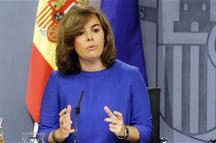 Pool MoncloaThe Council of Ministers approved, for its submission to Parliament, the Draft Law regulating the National Library of Spain, under which the essential role of this institution is recognised in preserving and spreading Spanish culture.
Pool MoncloaThe Council of Ministers approved, for its submission to Parliament, the Draft Law regulating the National Library of Spain, under which the essential role of this institution is recognised in preserving and spreading Spanish culture.
Soraya Sáenz de Santamaría underlined that "the institution is provided with certain instruments that will enable it to be managed more flexibly and underpin its role as the leading State library institution and as an international benchmark centre for access to information and knowledge of the Spanish language".
Other agreements
The Vice-President of the Government reported on the approval of the Regulation of the Diplomatic Career, which further develops the Law on the State's Foreign Action and Service. The text provides that diplomatic officials are the special body of the public administration services tasked with carrying out duties of a political, diplomatic and consular nature of the State's foreign service.
Soraya Sáenz de Santamaría also referred to the Royal Decree establishing the concepts included in the National Insurance contribution base. Companies have until 30 September to settle and pay in the corresponding contribution for the monthly periods between December 2013 and July 2014.
Current affairs
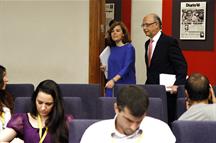 Pool MoncloaAt the start of the press briefing following the Council of Ministers, the Vice-President of the Government, expressed the government's condolences for the victims of the plane accident in Mali and its solidarity with their families. She also confirmed that both the airline - Swiftair - and the aircraft had the necessary licences to operate and had satisfactorily passed the inspections that had been carried out. She also declared the government's intention to collaborate in the search activities and the subsequent investigation into the causes of the accident. In fact, the Minister for Defence, Pedro Morenés, has made several aircraft and investigators available to France and the Ministry of Public Works has implemented a protocol on care to the families of the victims.
Pool MoncloaAt the start of the press briefing following the Council of Ministers, the Vice-President of the Government, expressed the government's condolences for the victims of the plane accident in Mali and its solidarity with their families. She also confirmed that both the airline - Swiftair - and the aircraft had the necessary licences to operate and had satisfactorily passed the inspections that had been carried out. She also declared the government's intention to collaborate in the search activities and the subsequent investigation into the causes of the accident. In fact, the Minister for Defence, Pedro Morenés, has made several aircraft and investigators available to France and the Ministry of Public Works has implemented a protocol on care to the families of the victims.
As regards the meeting to be held on Wednesday 30 July between Mariano Rajoy and Artur Mas, Soraya Sáenz de Santamaría stressed that the government is approaching the meeting with an "open and constructive spirit", as it always does in all meetings with regional officials, in which we are also "the government". In relation to the referendum on self-determination proposed by Artur Mas, the Vice-President of the Government reiterated that "we can do nothing about that" and hence it would be a good idea for the President of the Regional Government of Catalonia to renounce this initiative.
Soraya Sáenz de Santamaría defined the announced meeting between President of the Government Rajoy and the incoming General Secretary of the Socialist Party, Pedro Sánchez, as "an initial contact" that will make evident the degree of agreement on major State issues and the PSOE's position on the main issues, including economic issues.





